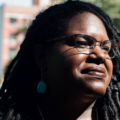The Date (redux)

In her essay “The Date,” Brenda Miller talks about the photos we hang on our refrigerators, photos of ourselves with those we love. We originally hang them to remind ourselves of who we are, that we are successful and loved. But over time the same photos blend into the routine and become a carefully constructed persona not for ourselves but for others—“look how athletic / spiritual / loved I am.”
No pictures of my own face, or even faces of those I love, on my refrigerator. Instead I’ve chosen thumbnails of favorite paintings and copies of poems:
- “Two Men at a Table” by Erich Heckel, both men leaning toward each other, brows furrowed in anger or fear or maybe just intention. They face outwardly more than directly at each other, like actors on a stage or as if some kind of force is keeping them from looking each other in the eye.
- Leonid Pasternak’s illustration of the ball scene in War and Peace. Natasha leans forward, intent on Andrei’s face. Pierre stands behind, only his right ear visible from behind Andrei’s head. I like this painting for what’s left unknown: the expression on Pierre’s face, the blur of a ball gown in the background.
- Ilya Glazunov’s illustration of Alyosha from The Brothers Karamazov, sorrowful and absent-minded. The lines of the church in the background are sharp in places, blurred and out of focus in others, a paradox of occluded clarity.
- The poem “How to Like It” by Stephen Dobyns, which ends with the man “staring into the refrigerator / as if into the place where the answers are kept—… / answers to what comes next and how to like it.”
What does this collection say about me? Does it imply that I am not loved or that I don’t have the basic self-esteem required to look at a photo with myself in it? Perhaps so. Here I have placed pictures and poems that expressed the confusion I felt about the world around me. When I moved into this apartment, I had recently graduated from college, new in a city where I knew no one, and there was a lot about the world I didn’t understand—of course, there still is. These paintings and poems were a comfort. They reminded me that I was not alone, that I was not the only one who didn’t have it figured out. They made the place a home.
Edith Wharton, in The Decoration of Houses, says that the main purpose of decoration is to make the house comfortable for its occupants. She advocated for ample private space in a home, purely personal spaces apart from public ones. I think she would criticize my refrigerator for its cluttered appearance and for placing Heckel’s harsh strong lines next to the delicate ones of Pasternak. But I think she would approve too that I had made this space a refuge.
I’m examining my refrigerator because a man I like is coming for dinner tonight. I can’t help but wonder how his opinion will be shaped by my refrigerator. What kind of persona have I constructed with this collection? I consider editing my refrigerator door, but what would I remove or add? I would have to start over. I would have to filter through all the pictures on my computer and stop by the drugstore to get them printed.
Is it part of the game I’m supposed to play or is it childish to edit my life (not even my life but only the appearance of it) into something that might appeal to this man? [1]
Yesterday in the grocery store, I thought to buy some milk for tonight—not beer or wine because I’m making breakfast for dinner: pancakes and scrambled eggs—but froze in front of the glass refrigerator door. What kind of milk does he drink? Skim? Two percent? Whole? I usually buy skim, preferring to waste saturated fat and cholesterol on more enjoyable things, but I didn’t want to come across as a skim milk kind of person. But skim would be more honest.
After five minutes staring down my options behind the glass, I chose orange juice. Still a lot of options (brand, amount of pulp), but nothing that seemed so fraught.
This panic is normal, the long tradition of pre-date panic. I grab my phone and look again at the text he sent after our last date: “I had a truly fantastic day today.” Such strong language. Too strong? Most of our time was spent in silence, I thought, really long silences—ten or twenty minutes long. Silence like that is a fixture of all my human relationships, even the closest ones [2], but what if he takes this as a sign that we’ve already run out of things to talk about? That day, my mind raced frantically, trying to think of something to say, working itself into such a frenzy I couldn’t think of anything at all. Panic.
I look at the text again: “I had a truly fantastic day today. I wouldn’t have wanted to spend it with anyone else.” This is the game, this shifting of appearances, this following the script, this setting up a smokescreen so that the other person only sees you through a haze of something more beautiful than you are. It means affirmation over honesty. It means acquiescence over opinion. It means editing your fridge. I wonder if we see anything of the other person’s true self. Surely this can’t be a good foundation for a healthy relationship.
The last boy I dated was some five years ago. I was in college, and he was one of my close friends when we started dating. On our second or third date we drove to nearby Dayton, Ohio, so that he could pick up a new guitar amp. It was a sunny autumn afternoon, and on that drive I confessed every fault of mine I knew of, everything about my past that might have negative repercussions in the future: that I was bossy as a child and rebellious; that a year ago I had vaguely thought about committing suicide. I thought I could warn him what he was getting himself into before he wasted too much time with me.
This over-extracted honesty was characteristic of my college friends. We were all equally young and dependent on each other for company, for advice, for emotional and existential affirmation. We saw each other multiple times a day. I knew how each of them drank their coffee, knew their allergies and their favorite foods, and could identify their moods.
Not so with this man. I think we would both say we’ve been friends for about a year, but I only just learned how he drinks his coffee—he doesn’t drink coffee—and I don’t know what kind of milk he drinks. I’m still trying to memorize his height, the shade of his eyes, the cadence of his voice, the pattern of freckles along his cheekbones.
Thank god I am still young enough to bungle the rules of the game a bit.
I look in the mirror. The French braid I did this morning is loosening and the whole thing looks a little windblown, flyaways sticking out at rakish angles. I never could pull off the tousled look. I try to smooth some of the strays with my palm. I want it to look carefree. My makeup is holding up, although it’s so simple that anyone of average attentiveness could mistake it for none at all.
I peer at my face in the mirror, the features I know so well. My lips are full although my mouth is small, emphasizing the formlessness of the rest of my face, my cheekbones and jawline barely discernible. My eyebrows arch a little too far forward and my nose is large and always a little red. I cannot imagine anyone liking this face. This man has yet to tell me I’m pretty, although I can’t complain because it’s a mutual shortcoming. It’s okay; it’s not something I need to hear or that my identity depends on, but I pick out the words I’ll use to fix this. I’ll say, “Hey. Your eyes are pretty and I like your freckles.” To which I don’t think he’ll laugh. He might say “Thank you.” He might crack a joke. He might reciprocate.
Waiting for him to arrive, I sit on the couch and look at my surroundings. I gave little thought to appearance when I moved here—I didn’t even hang curtains or paint the one wall my leasing contract allows me to paint. I bought my furniture from a consignment shop. It’s comprised of mismatched wood grains with dents and words scratched into the surface by a previous owner.
My only thought was function. I placed the lamps next to the places where I read. I put the desk next to the internet router. The furniture is pressed against the walls to maximize space in the middle of the room. Even so, I like the furniture—warm wood tones with modest curves and flourishes. The coffee table and the end table are perfectly proportioned to the couch. The couch is neither spare nor excessively fluffy. When the lamps are on, it does actually look cozy.
If my home is a reflection of my soul, then I am: beige drywall; a blue, red, and green plaid couch; a wooden coffee table with cloudy heat stains and a chipped finish; an internet router; soft white fluorescent light.
Above my couch, I’ve hung a collection of old family photos in wooden frames. I picked photos that seemed to capture who they were. Two of my great-aunts laugh together at something off-camera. My great-grandparents pose for a picture when my great-grandmother turns her head to call to someone in another room. I like to think these souls have been a good influence on me, but who’s to say? Like the pictures on my refrigerator, these, too, have faded into the background.
Two years after graduating college, my life has just begun to solidify. The books do not overflow the bookcase; the stacks of paperwork remain neat on my desk. I wonder if there is space in my life for a man, or maybe my habits are becoming reflexive, my opinions rigid, my routines settled. It’s in the little things: the couch cushion I sit on, the order in which I stack the dishes in the dish rack, the places on the counter where I keep the tea kettle, the coffee maker, the kitchen scale.
It’s in the rhythm of daily life. I have gone to work and returned at the same time every day for two and half years. The routine of evenings has changed every few months but has still settled into a ritual, of turning on the computer, of spooning dinner into a bowl, of lying on the couch to read. On the wall next to my front door, I’ve taped a quotation from Lawrence Sutin’s A Postcard Memoir:
Returning home after dealing with people, I have the sense of silence rushing at me as I unlock the door. There is the same brief echo of turmoil as with water just gone down the drain, and then nothing except for my own noises that I don’t hear… The deep, daily silence of single life seldom survives the decision to marry. That was the loss for me, not monogamy… Stepping back into silence is now a fantasy, as in the old tales when one stepped into Faery unawares, nothing changed so much as lit from within. I’ve often contemplated climbing the steps to the lasting Tower of Silence but then grown afraid. I fear that it would be weakness—evading the world. I fear I would contract what the monks called acedia, dryness. I fear I would worship my own hallucinations…
This apartment feels like a tower of silence. I close the door and hear that echo of turmoil down the drain. It leaves a vacuum of noise, of time, sealed against the outside. The silence is tangible, soft and comforting as flannel. I want to stretch myself along the length of it or to admire the warmth of the hallway light, brighter for the walls containing it. In here, there is space, there is time, to pick apart the world and piece it back together again. And yet I never do, choosing instead to stall by watching TV and eating too much.
I look outside my second-story windows and see tree limbs, telephone wires, the roof of the garage, the roofs of other buildings—the middles and tops of things—and I feel unmoored.
I think about living sixty more years alone like this (best to prepare for the worst). I fear that my life will have dried out, my skin as dry as paper, bones brittle as chalk, blood turned to dust. I imagine wandering through a home all stone and sand, its furniture missing limbs and walls out altogether. I know there is a bottom to which I am headed and I know I am far from it.
A knock at the door startles me. I pause for a moment and look at the straightened couch cushions and the picture frames above it. I look toward the laundry closet, the carpet in front noticeably more spacious now that its doors are closed—everything looks so spacious and expectant and hopeful. I try to conjure in my mind the image of this man behind the door, standing on the balls of his feet one foot in front of the other, right hand poised to knock, eyes wide and eyebrows raised in a casual half-smile sort of greeting.
I briefly consider leaving the door unanswered. I could stay here in my tower of silence until I can look at myself in the mirror, until I am brave enough to buy my own kind of milk, until I figure out the expressions of the people on my refrigerator, until I learn how to be content sitting on my couch alone, until I find the answers to what comes next and how to like it. I smooth my hair again, take a deep breath, and casually open the door.
[1] It occurs to me now, a couple months later, that choosing pictures of things you know you have in common might serve as a conversation starter.
[2] Especially the closest ones—in high school, my sister and I often took half-hour car rides in amicable silence.
About Rachel Belth
Rachel Belth is an instructional designer, creative nonfiction writer, and poet. Her work has appeared in Prick of the Spindle Online, Hypertext Magazine, and Embodied Effigies, among other places, and she volunteers as a copyeditor at the literary website Identity Theory. She holds a B.A. in Technical and Professional Communication from Cedarville University. She writes from a south-facing window in Columbus, Ohio.





